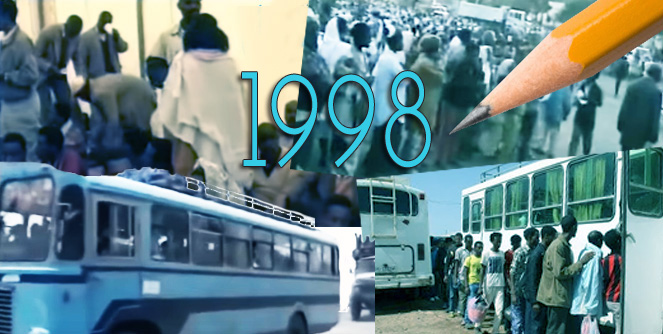On Sanctioning The Eritrean Regime
 On December 23, 2009, the UN Security Council imposed sanctions on Eritrea over “its role in Somalia” and its“refusal to withdraw troops following conflict with Djibouti.” This may be a good time to remind all that only Qaddaffi was opposed to the sanctions. The UNSC Resolution 1907 “stipulates arms embargo, travel restrictions, asset freezes” on key “political and military leadership” of the regime and expands the mission of the Somalia Monitoring Group (in effect since 1992) and renames it the Somalia Eritrea Monitoring Group. Since then, the reaction of those opposed to the sanctions, nearly all of whom are accomplices of the Eritrean regime, and those supportive of the sanctions, all of whom are opposed to the regime, has been a microcosm of Eritrean politics.
On December 23, 2009, the UN Security Council imposed sanctions on Eritrea over “its role in Somalia” and its“refusal to withdraw troops following conflict with Djibouti.” This may be a good time to remind all that only Qaddaffi was opposed to the sanctions. The UNSC Resolution 1907 “stipulates arms embargo, travel restrictions, asset freezes” on key “political and military leadership” of the regime and expands the mission of the Somalia Monitoring Group (in effect since 1992) and renames it the Somalia Eritrea Monitoring Group. Since then, the reaction of those opposed to the sanctions, nearly all of whom are accomplices of the Eritrean regime, and those supportive of the sanctions, all of whom are opposed to the regime, has been a microcosm of Eritrean politics.
The supporters of the regime have organized themselves and waged an all-out offensive against the work of the sanctions committee and its monitoring group. In the Diaspora, they have lobbied; they have petitioned; and they have organized rallies. Inside Eritrea, the regime’s “Kebele” or zonal administrators have whipped the choice-less people to participate in rallies carrying banners that “We Are Him, and He Is Us” (the “he” being dictator Isaias Afwerki) and the state media has railed against the “unjust and illegal” UN sanctions.
Meanwhile, the opponents of the regime have, characteristically, chosen to do little. They have either engaged in a futile game of one-up-manship, chronicling how they were the first to recommend this course of action, alleging that other members of the opposition are not as staunchly pro-sanctions as they are, or they have done what they do best: nothing. There has been, todate, little organized mechanism to facilitate the work of the Sanctions Committee, no organized system to help the Somalia Eritrea Monitoring Group connect the dots. All of the former supporters of the regime who have a wealth of information about the inner workings of the PFDJ regime—how it raises funds, how it transfer funds, how and where it conducts training of Somali extremists, how it imports ammunition, who pays for it, how it gets transferred, who are the key PFDJ officials facilitating it—have chosen to just melt into the apathetic Diaspora and wait for somebody else to come forward.
And, typically, those in the Opposition who are always looking for a wedge issue to differentiate themselves from their fellow opposition members have used this as yet another opportunity for market differentiation. This group, with meskerem.net at the forefront, is always confusing jingoism for patriotism. They are in some sort of pathetic audition to demonstrate to the PFDJ (as if the PFDJ gives two dimes for their opinion) that they love Eritrea just as much as the PFDJ does. In their delusion, they think that if they use all the yardsticks the PFDJ uses to measure patriotism—flag-waving, chest-thumping, xenophobia, paranoia, Ethiopia-bashing, West-bashing, UN-bashing and, most importantly, fellow Eritrean-bashing—they too will be perceived as patriotic and potential invitees to the exclusive club of “patriots.” In due time, they will come to learn that the PFDJ has no political space for anyone but itself and has never shared power with anyone.
Sadly, where we in the opposition are is where we have always been: the cause of the Eritrean opposition is advanced by anybody but the Eritrean opposition. Sometimes it is “Western advocacy groups,” sometimes it is humanitarian and religious organizations, and sometimes it is the sheer incompetence of the PFDJ that has kept our cause on the radar. But we are hard pressed to think of an example where the Eritrean opposition has been at the forefront of an event that could help bring relief to the Eritrean people.
Perhaps the most effective way to dismantle the hollow shell that is the PFDJ is to starve the parasitic entity from everything it lives off. The Eritrean regime has virtually no source of hard currency, since it has reduced the Eritrean economy to rubble. The only way it can generate hard currency is by facilitating contraband goods—whether those are illicit or illegal. The only way it can generate hard currency is by being the errand boy for third parties with shady regional goals. In this regard, one is hard pressed to think of a single more effective campaign to starve the PFDJ than the UNSC-authorized smart, targeted resolution of travel restrictions and asset freezes on the political and military leadership.
The PFDJ and its supporters are betting that the Sanctions Committee and its Monitoring Group will run out of steam: that after years of going around visiting countries and conducting interviews, they will come back with nothing conclusive and the UNSC will have no choice but to rescind its resolution. Whether that will work or not, at least it is a strategy.
On the other hand, the Eritrean opposition has no discernable strategy to ensure that the sanctions regime will work—and if they do, they have kept it a secret. They are just waiting for somebody else to do all the work for them. As far as we know there has not yet been an ad-hoc committee, a sanctions support group or any entity formed by the Eritrean opposition to provide information or guidance to the Sanctions Committee. If this is to change, the Eritrean opposition must have a clear strategy on what it is willing to do, and then take the initiative to do it.
Self Evaluation
Since awate.com is part and parcel of the opposition, it is fair to turn the table and ask: what is your position on the sanctions? And what is your strategy to make it succeed? Our position is: we are all for any measure that is targeted directly at the regime. Long before sanctions were contemplated, this website called for targeted sanctions against the regime on a much publicized petition campaign in February 22, 2006. The specifics of the campaign were:
- A ban on entry visas to all Isaias regime officials who seek to travel to Western nations;
- Curtailing the regime’s ability to raise funds in foreign countries;
- Stopping its covert and overt international commercial, banking and other enterprises.
- Assist in lifting the campaign of intimidation the Isaias regime imposes on Eritreans living in the Western nations.
Our position was further reiterated in our editorial on November 29, 2009.
Thus, we think our position has been consistent. Where this website has expressed reservations on the sanctions have only been in the one area where they go beyond being regime-targed (travel ban, asset freeze) and become a burden to any post-PFDJ people’s government (arms embargo.) It is for this precise reason that we objected when the US State Department was mulling over labeling the country with something so derogatory it may last generations (State Sponsor of Terror) and recommended that they come up with more specific regime-targeted classification (“Outpost of Tyranny.”)
That’s what we believe. As for action, we have been in our limited way, attempting to do two things: first, to tell our readers not to believe the hype from the supporters of the PFDJ tyranny that the sanctions are dead, that they have prevailed, that they have overcome etc. No they haven’t. The UN, as everybody knows, moves at a snail’s pace but with every passing day, it is accumulating damning evidence about the PFDJ’s mafia tactics. Second, we have been, in our limited way, trying to work with members of the UNSC-mandated sanctions committee, chaired by Mexico’s ambassador to the UN.
More Action Required
The PFDJ lives off creating a false momentum and then demoralizing the opposition–into paralysis and inaction. What we have been seeing with the opposition is that, for some, Resolution 1907 never happened–they either don’t think it will amount into action, or, if it will, they don’t think they have a role and they are mere passerbys. They think that the case is closed and sanctions are coming and no additional work is needed. Some within the opposition, unfortunately, have been writing as if they were single-handedly responsible for Resolution 1907 and they don’t have to do anything other than to remind people that they were the first to call for it. With some in the opposition, it is really hard to see why they call themselves opposition since they spend most of their time and energy attacking their fellow-travelers and echoing the propaganda of the Eritrean regime and using all its code words warning against “disunity” and “treason.”
What is needed now is action. It would be more effective, more likely to yield results if the Eritrean opposition could form a sanctions facilitating committee whose function would be to inform Eritreans of new developments and to help the UN Sanctions Committee with its work. The UN Security Council is made up of member states who have varying degrees of enthusiasm for imposing sanctions against rogue states and what will tip the balance is if the evidence collected against the regime is specific and overwhelming. This can only come about if there is sustained level of input and co-ordination from the Eritrean opposition. If you are an individual who is not a “joiner” but has information that you think would be useful, please communicate your information to us at awateteam@awate.com. If, for whatever reason, you do not want to work with Awate or the opposition groups, then contact the sanctions committe of the UN directly. The sanctions committee is chaired by the Mexican ambassador to the UN and its contact information is publicly available. What is not an option is to do nothing and then to wonder why nothing led to nothing.



Awate Forum